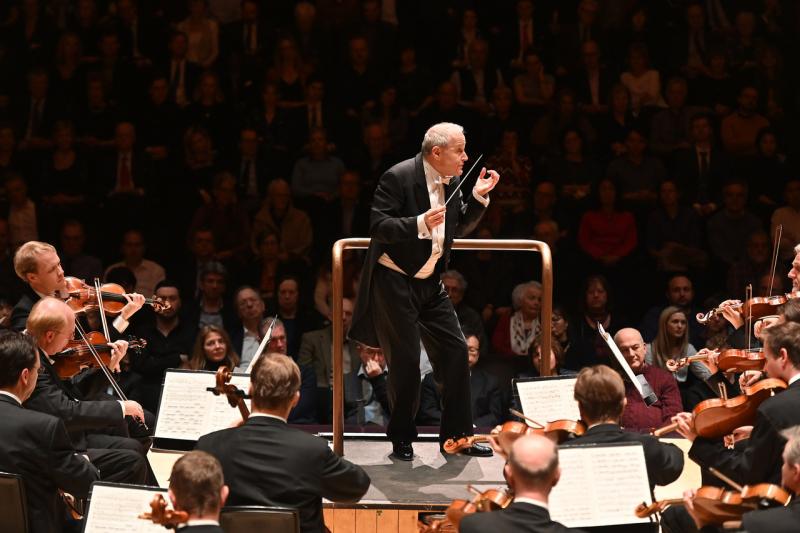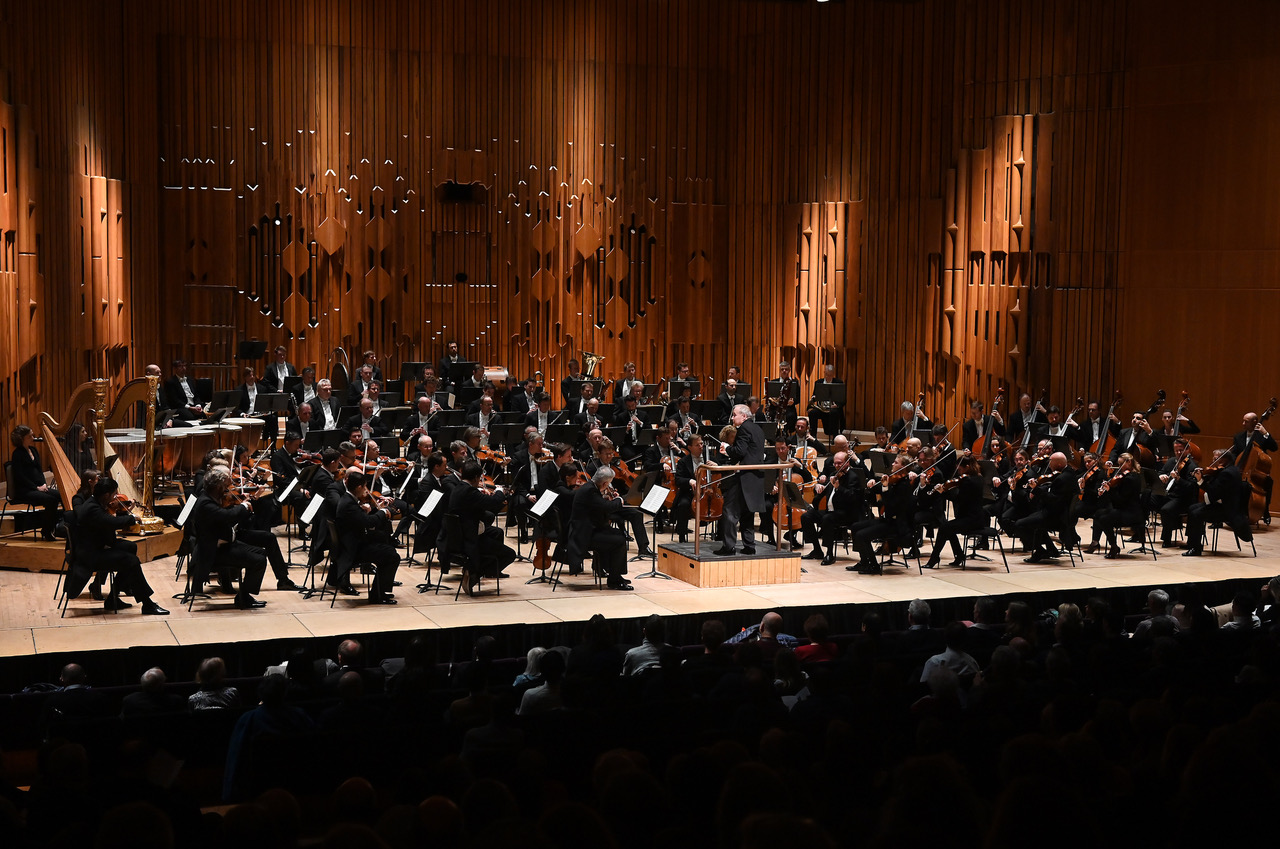Vienna Philharmonic Orchestra, Ádám Fischer, Barbican review - ferocious Mahler 9 without inscape | reviews, news & interviews
Vienna Philharmonic Orchestra, Ádám Fischer, Barbican review - ferocious Mahler 9 without inscape
Vienna Philharmonic Orchestra, Ádám Fischer, Barbican review - ferocious Mahler 9 without inscape
Brutally brilliant playing, but inwardness only came at the end of this performance

Give me some air! Stop screaming at me! Those are not exclamations I'd have anticipated from the prospect of a Vienna Philharmonic Mahler Ninth Symphony, least of all under the purposeful control of Ádám Fischer.
The Barbican is bad for Mahler; it's difficult for all but those conductors familiar with its magnifying tendencies to achieve depth, perspective and genuine pianissimos (though Kirill Petrenko managed it in a lightly sprung Mahler Seventh with the Bavarian State Orchestra). Only at the end did this interpretation withdraw as it should. In the first movement, the fragile humanity which gets blitzed by the threat of mortality again and again simply sounded too confident; nor did the febrile Fischer give it the occasional space it needs (a volatile, relatively fast reading is fine, as Abbado proved in Lucerne, so long as the rubato "gives" enough from time to time). Certainly the attacks have rarely sounded more feral, yet at the same time dazzlingly clear-textured, and the brass's apocalyptic warnings were focused in their blatancy; but I didn't feel the anguished heroism of the symphonic protagonist's climb out of each abyss, nor the pathos in a beautifully played twilight coda. (PIctured below: Fischer and the orchestra - NB: still few women in important positions). Grotesquerie in the middle movements reached a high watermark in the superlative chunters and shrillings of the VPO woodwind, the supremacy of the horns and a hyper-brilliant, angry tornado at the end of the Rondo-Burleske; again, though, what should have been the balancing other-worldiness - echoing the symphony's opening theme in the scherzo, anticipating the finale's death-threnody in its successor - simply stayed with its feet firmly planted on firm earth.
Grotesquerie in the middle movements reached a high watermark in the superlative chunters and shrillings of the VPO woodwind, the supremacy of the horns and a hyper-brilliant, angry tornado at the end of the Rondo-Burleske; again, though, what should have been the balancing other-worldiness - echoing the symphony's opening theme in the scherzo, anticipating the finale's death-threnody in its successor - simply stayed with its feet firmly planted on firm earth.
Were those glorious strings in the end-of-life hymn simply too knowing? More air around the sound in a venue like Symphony Hall Birmingham or the Müpa concert hall in Budapest, perhaps the best acoustic of all which Fischer knows so well, might have told a different story; here, until we reached the last cries and whispers, it was simply the masterful harrowing of hell. Togetherness was always in evidence, as it hadn't been when Daniel Harding conducted the orchestra in the Sixth Symphony at the Proms. Kudos to the tirelessly sophisticated playing and the thrill of the more lunatic charges; but this heart stayed cold.
rating
Share this article
The future of Arts Journalism
You can stop theartsdesk.com closing!
We urgently need financing to survive. Our fundraising drive has thus far raised £49,000 but we need to reach £100,000 or we will be forced to close. Please contribute here: https://gofund.me/c3f6033d
And if you can forward this information to anyone who might assist, we’d be grateful.

Subscribe to theartsdesk.com
Thank you for continuing to read our work on theartsdesk.com. For unlimited access to every article in its entirety, including our archive of more than 15,000 pieces, we're asking for £5 per month or £40 per year. We feel it's a very good deal, and hope you do too.
To take a subscription now simply click here.
And if you're looking for that extra gift for a friend or family member, why not treat them to a theartsdesk.com gift subscription?
more Classical music
 Hallé John Adams festival, Bridgewater Hall / RNCM, Manchester review - standing ovations for today's music
From 1980 to 2025 with the West Coast’s pied piper and his eager following
Hallé John Adams festival, Bridgewater Hall / RNCM, Manchester review - standing ovations for today's music
From 1980 to 2025 with the West Coast’s pied piper and his eager following
 Kaploukhii, Greenwich Chamber Orchestra, Cutts, St James's Piccadilly review - promising young pianist
A robust and assertive Beethoven concerto suggests a player to follow
Kaploukhii, Greenwich Chamber Orchestra, Cutts, St James's Piccadilly review - promising young pianist
A robust and assertive Beethoven concerto suggests a player to follow
 Robin Holloway: Music's Odyssey review - lessons in composition
Broad and idiosyncratic survey of classical music is insightful but slightly indigestible
Robin Holloway: Music's Odyssey review - lessons in composition
Broad and idiosyncratic survey of classical music is insightful but slightly indigestible
 Classical CDs: Wolf-pelts, clowns and social realism
British ballet scores, 19th century cello works and contemporary piano etudes
Classical CDs: Wolf-pelts, clowns and social realism
British ballet scores, 19th century cello works and contemporary piano etudes
 Bizet in 150th anniversary year: rich and rare French offerings from Palazzetto Bru Zane
Specialists in French romantic music unveil a treasure trove both live and on disc
Bizet in 150th anniversary year: rich and rare French offerings from Palazzetto Bru Zane
Specialists in French romantic music unveil a treasure trove both live and on disc
 Scottish Chamber Orchestra, Ibragimova, Queen’s Hall, Edinburgh review - rarities, novelties and drumrolls
A pity the SCO didn't pick a better showcase for a shining guest artist
Scottish Chamber Orchestra, Ibragimova, Queen’s Hall, Edinburgh review - rarities, novelties and drumrolls
A pity the SCO didn't pick a better showcase for a shining guest artist
 Kilsby, Parkes, Sinfonia of London, Wilson, Barbican review - string things zing and sing in expert hands
British masterpieces for strings plus other-worldly tenor and horn - and a muscular rarity
Kilsby, Parkes, Sinfonia of London, Wilson, Barbican review - string things zing and sing in expert hands
British masterpieces for strings plus other-worldly tenor and horn - and a muscular rarity
 From Historical to Hip-Hop, Classically Black Music Festival, Kings Place review - a cluster of impressive stars for the future
From quasi-Mozartian elegance to the gritty humour of a kitchen inspection
From Historical to Hip-Hop, Classically Black Music Festival, Kings Place review - a cluster of impressive stars for the future
From quasi-Mozartian elegance to the gritty humour of a kitchen inspection
 Shibe, LSO, Adès, Barbican review - gaudy and glorious new music alongside serene Sibelius
Adès’s passion makes persuasive case for the music he loves, both new and old
Shibe, LSO, Adès, Barbican review - gaudy and glorious new music alongside serene Sibelius
Adès’s passion makes persuasive case for the music he loves, both new and old
 Anja Mittermüller, Richard Fu, Wigmore Hall review - a glorious hall debut
The Austrian mezzo shines - at the age of 22
Anja Mittermüller, Richard Fu, Wigmore Hall review - a glorious hall debut
The Austrian mezzo shines - at the age of 22
 First Person: clarinettist Oliver Pashley on the new horizons of The Hermes Experiment's latest album
Compositions by members of this unusual quartet feature for the first time
First Person: clarinettist Oliver Pashley on the new horizons of The Hermes Experiment's latest album
Compositions by members of this unusual quartet feature for the first time

Add comment